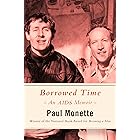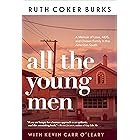| Digital List Price: | $17.99 |
| Kindle Price: | $11.99 Save $6.00 (33%) |
| Sold by: | Amazon.com Services LLC |
Your Memberships & Subscriptions

Download the free Kindle app and start reading Kindle books instantly on your smartphone, tablet, or computer - no Kindle device required.
Read instantly on your browser with Kindle for Web.
Using your mobile phone camera - scan the code below and download the Kindle app.

OK
 Audible sample Sample
Audible sample Sample 


Afterlife: A Novel Kindle Edition
Afterlife is a haunting and unforgettable story of men facing loss and seeking love, movingly capturing the moment in the 1980s when the AIDS epidemic was completely devastating the American gay community. Here, National Book Award winner Paul Monette depicts three men of various economic and social backgrounds, all with one thing in common: They are widowers, in a way, and all of their lovers died of AIDS in an LA hospital within a week of one another.
Steven, Sonny, and Dell meet weekly to discuss how to go on with their lives despite the hanging sword of being HIV positive. One tries to find a semblance of normalcy; one rebels openly against the disease, choosing to treat his body as a temple that he can consecrate and desecrate at will; and one throws himself into fierce political activism. No matter what path each one takes, they are all searching for one thing: a way to live and love again.
Afterlife finds Paul Monette at his most autobiographical, portraying men in a situation that he himself experienced, and one that he described to critical acclaim in the award-winning Borrowed Time: An AIDS Memoir.
This ebook features an illustrated biography of Paul Monette including rare images and never-before-seen documents from the Paul Monette papers of the UCLA Library Special Collections.
- LanguageEnglish
- PublisherOpen Road Media
- Publication dateApril 22, 2014
- File size4946 KB
Customers who bought this item also bought
Editorial Reviews
From Publishers Weekly
Copyright 1991 Reed Business Information, Inc.
From Library Journal
-James E. Cook, Dayton & Montgomery Cty. P.L., Ohio
Copyright 1990 Reed Business Information, Inc.
About the Author
Paul Landry Monette was an American author, poet, and activist best known for his essays about gay relationships.
Product details
- ASIN : B00JDY7RJG
- Publisher : Open Road Media (April 22, 2014)
- Publication date : April 22, 2014
- Language : English
- File size : 4946 KB
- Text-to-Speech : Enabled
- Screen Reader : Supported
- Enhanced typesetting : Enabled
- X-Ray : Not Enabled
- Word Wise : Enabled
- Sticky notes : On Kindle Scribe
- Print length : 358 pages
- Best Sellers Rank: #768,389 in Kindle Store (See Top 100 in Kindle Store)
- #600 in LGBTQ+ Literary Fiction (Kindle Store)
- #902 in LGBTQ+ Literary Fiction (Books)
- #988 in Medical Fiction (Kindle Store)
- Customer Reviews:
About the author

Discover more of the author’s books, see similar authors, read author blogs and more
Customer reviews
Customer Reviews, including Product Star Ratings help customers to learn more about the product and decide whether it is the right product for them.
To calculate the overall star rating and percentage breakdown by star, we don’t use a simple average. Instead, our system considers things like how recent a review is and if the reviewer bought the item on Amazon. It also analyzed reviews to verify trustworthiness.
Learn more how customers reviews work on Amazon-
Top reviews
Top reviews from the United States
There was a problem filtering reviews right now. Please try again later.
In the center of this trio is Steven Shaw, whose home provides the oasis of last resort for the men and their friends. Grieving and calloused, depressed and moody, Steven attempts to combat his indifference towards the travel agency he owns, remoteness from an employee who is close to death, and disinterest in the possibility of a new relationship. His journey is aided by Margaret, who runs his business in his absence and cares for the dying Ray, and by Mark, a Hollywood executive with whom he unexpectedly falls in love.
Steven's fellow survivors are less centered and more erratic, however. Dell Espinoza allows his anger and grief to degenerate into an obsessive aggression towards an uncaring society and he funnels his hostility towards acts of vandalism, reserving his most vicious attacks for a loathsome, gay-hating evangelist. Not even a loving, empathetic sister Linda can save Dell from his own fury. Stunningly attractive and intellectually shallow, Sonny Cevathas (the third widower) deals with his grief by ignoring it altogether. Discounting his own health problems as minor inconveniences, believing that New Age trickery and "positive thinking" can halt his own demise, and searching for a rich man to immerse him in undeserved luxury, Sonny is the book's most wicked (although, I'm afraid, scarily accurate) portrayal of one of many men who fooled themselves into initially believing that AIDS could be simply wished away.
Depression, anger, and denial--the paths taken by these three incompatible friends--are rarely so clearly demarcated as they are in Monette's characters. (Dell especially represents an extreme that is, thankfully, scarce.) But the author injects his tale of loss and sorrow with enough humor and affection to keep it from the edge of hopelessness. Not just a book about death and dying, "Afterlife" is, more than anything, a book about learning to live again.
The characters are well formed, not sterotypical, and show how any human can react to a loss of a loved one to something so meaningless.... Gay or straight in so much of it is not relevant. It more than anything else I have read, shows the devestation and the legacy that AIDS has left behind.
Monette's writing got better with AIDS, the books had a focus and that trend continues here, though for much of the first half of the book he struggles to overcome his old writing style, that of a privileged man writing from a pedestal and casting only half an eye at his subjects. Its especially difficult to write a book with all men, all white gay men, and be able to keep the characters separate. One supposes they're all friends due to their similarities but for the first half of the book I had no idea who was who, and I suppose I didn't really care. The second half of the book the action picks up and at the same time the story becomes more focused on just two people, rather than the confusing eight at the beginning, and the book became good. I was surpassed, I was all set to give it a negative review but I'm glad I stuck with it.
The book details a life lived in between the falling bombs of the AIDS epidemic. There is desperation, such as when a character "called the Federal Building, demanding release of a drug that people were smuggling in from China." I understand the frustration, but actions like this led to the over-prescribing of AZT and the death of early patients.
As the novel continues Monette loses most of his detachment from the characters and once they become real this novel becomes the heart-felt AIDS crisis snap-shot it should be. It just takes a little too long to get there.












